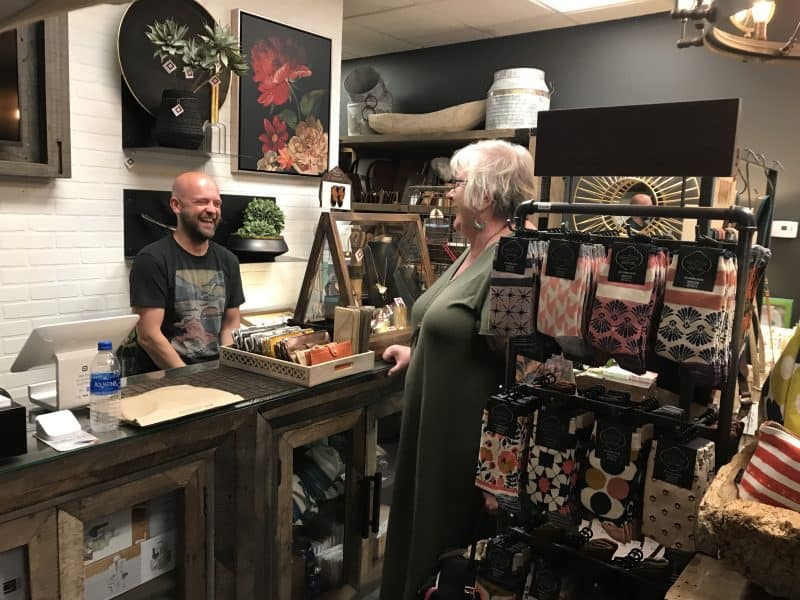
I’m sharing notes from sessions and conversations at the International Economic Development Council annual conference in Dallas. First up: Retail!
Lacy Beasley of Retail Strategies moderated a panel on retail real estate and development. While it was mostly big city stuff, several topics were relevant for smaller towns.
How to convince a property owner to reinvest in their retail strip, center or even one building in a small town
Herb Weitzman, a Dallas area retail developer, said that many retail real estate owners think ‘we’re not making any money so we can’t invest in our store or our shopping center.’
As a former rural retail store owner, I certainly recognized that small town, small business attitude.
However, Herb said that much like investment in remodeling and modernizing a retail store will increases its sales, it will also increase overall sales and the corresponding rents for retail centers. It’s possible that this is the right motivation to get some owners to act.
Small, rundown retail spaces can actually be a good long-term investment, Herb said. Buy them, fix them up and get a return.
For a small town, maybe it’s possible to find an outside investor who will purchase the rundown spaces, or to organize a coalition or cooperative of local investors to take it on.
One municipal official from a town of 50,000 people said they need to revitalize a dilapidated shopping center, but the owner will not reinvest in it. How can the city take a role?
Herb said that city governments often come to him to point out a possible deal, like revitalizing an existing center. They will help facilitate grant applications and other incentives to make the deal work.

Local retail stores are key to rural and small town economic development. Photo by Becky McCray
Small town retail recruitment strengths: friendly, quick permitting
Herb said he likes working with “micromarkets,” which I took to be at least close to micropolitans with 10,000 up to 50,000 population. They are much smaller and much friendlier. You can sit down with them and work things out.
And that’s your hidden secret as a small town: you’re small, you work with people personally, and you’re friendly.
Panelist Christopher Walker with Raising Cane’s Chicken Fingers said that retail deals are taking longer in the 2020s, especially permitting. It takes them an average of 370 days in the western US to get a permit, 203 days in central US, and 320 days in the east.
One store started in 2020 took until 2023 to permit, Chris said. All that time, stores or restaurants are paying “dead rent” for space they can’t do anything with. Many times they have employees hired, but waiting and doing nothing.
Those numbers shocked me. How long does it take for your small town to issue a retail permit? A week or two? Maybe a couple of months at the most? Start considering that a competitive advantage. And be sure you are extending just as much support to locally-owned retail stores as you would to a chain you would recruit.
Recruiting chain grocery stores
Another audience member said that their grocery market is considered saturated in a retail study, but the stores they have are dirty and under-stocked. How can she tell that story to recruit a new grocery retailer?
Rita Williams with Kroger said to work through a retail broker if you want to recruit a national brand. The national chain retail grocery recruitment process takes 3 to 5 years from start to store.
If existing stores are being neglected by their chains, try to find out if any of those existing stores are planning to pull out, Rita said. That additional information may help get a retailer to look past the “saturated market” label.
Knowing that an existing store plans to pull out is critical for small town and rural markets. You may only have one store, and you will want to act immediately to organize a cooperative or community-owned grocery.
Importance of local retail
Find out what the community wants before acting, Rita said.
It feels obvious, but too often local leaders are pressured into quickly making large investments in retail recruitment or supporting an outside chain.
If you want to save your town, start your own small business.
If you want more reports from IEDC or more practical information for small towns, subscribe to SmallBizSurvival.
- About the Author
- Latest by this Author
Becky started Small Biz Survival in 2006 to share rural business and community building stories and ideas with other small town business people. She and her husband have a small cattle ranch and are lifelong entrepreneurs. Becky is an international speaker on small business and rural topics.










